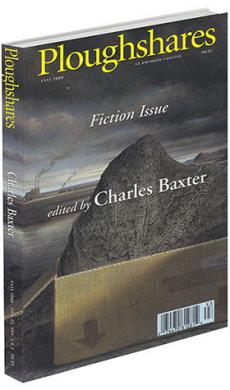rev. of Bad Judgment by Cathleen Calbert
Bad Judgment
Poems by Cathleen Calbert. Sarabande Books, $12.95 paper. Reviewed by Victoria Clausi.
Calbert’s second book,
Bad Judgment, is a searching, sometimes seething look at the traditions of love and marriage, revealing a strong voice adept in the use of irony. These poems frequently open onto a world poised between the surreal and the real, between loss and fulfillment, where the dominant voice vacillates between wanting the “dream / of wedding veils, floating higher, turning blue / in a world made of colors and marital sex” and disdaining them. “In my night sky, I have only men, harmonizing: /
There was a serpent who loved to sing, there was, /
there was, hiss hiss. Thus, he forsook his serpenting /
because he was in love, he was.” Another poem, which was included in
The Best American Poetry 1995, discovers a woman’s love for things reversed “until she was loved by trees and appliances, from toasters / to natural obstacles, until her ceiling shook loose to send kisses” and “until everything living and unliving wonderfully collided.”
Calbert seduces readers with satiric collisions from the start, even within the table of contents: “The Nights Were Full of Sex and Churches,” “The Woman Who Loved Things,” “My Dead Boyfriend,” “Dream Babies,” “The Vampire Baby,” “Dead Debutante,” “Lunatic Snow,” and “The Last Angel Poem.”
With an elegance reminiscent of Whitman, these poems celebrate the singer as vigorously as they do the song. The result: lyrics that are witty, cynical, sharp-edged, stunning. Although some critics might take exception to Calbert’s extensive use of catalogue, they’d have to concede that she is very good at the technique — so good, in fact, the reader is more likely to see herself reflected in the poem than she is to feel manipulated by the poet.
Mimicking the disassociation that loss can cause, “After the Tragedy” begins: “We put away the dishes. / Someone changed the sheets. / Windows were opened, then painted blue, and painted shut. / We wrote lists and threw the lists away.” After a transition that forces the mourners to claim, “We watched ourselves weep in the mirror to see how ugly we could be,” the speaker turns inward — to a wilder, darker, reflective list: “We slipped a sliver of faith into the lining of a checked apron. / We slipped a sliver of faith into the veins at our wrist, wondering if it would work its way to our heart. / We sang ‘Sweet Bird of Youth’ and ‘Sweet Mystery.’ ”
In “Beyond the Power of Positive Thinking,” Calbert’s well-tuned device of repetition is combined with sardonic little slaps at positivism gone bad. “I’ve stopped holding on to negative energy / and no longer need academic poverty. / I am radiant and free, calm and serene. / / It’s okay to have a green Mercedes. / I can accept a green Mercedes. / A green Mercedes is okay with me.”
Part of the pleasure of reading Calbert’s poetry is watching her play: with language, with sound, with tradition, with the reader.
Bad Judgment? Hardly. This is a wise book: sexy, witty, irreverent, and filled with moments of brilliance, carefully crafted by a poet who loves “the sweet suck of consenting molecules” so much she can’t help revealing the comic absurdity and beauty of the resulting collisions.
Bad Judgment delivers poems that are, in Richard Howard’s words, “so cool, so speculative, so disabused, so warm.”
Victoria Clausi teaches poetry at O’More College and in Bennington College’s July Program. Her limited-edition chapbook, Boarding House,
was published this June through Bennington College’s M.F.A. in Writing Alumni Chapbook Series.

